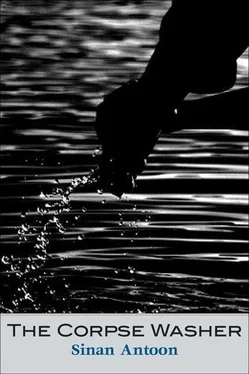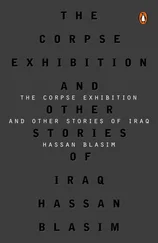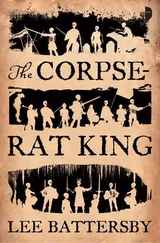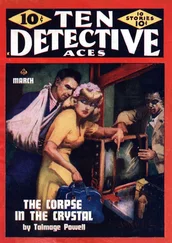Father filled the small bowl with water and motioned to Hammoudy, who sprinkled some of the ground lotus on the dead man’s head. Father started to lather the hair and scrub it. Once the head was washed, Hammoudy helped him turn the man on his side while Father kept repeating: “Your forgiveness. Your forgiveness.” He started to wash the right side of the body. First the head, then the right side of the face, neck, shoulder, arm, hand, chest, and belly. He kept pouring water and moving his hand softly along the body, repeating: “Your forgiveness, O Lord, your forgiveness.” When he reached the deceased man’s hips, he washed his private parts without removing the white cloth. Then he washed the leg, from the thigh to the toes. Then the two of them turned the body onto its back.
Father went to the other side of the bench and they turned the body on its left side to wash it. Father repeated the process with the same meticulousness from the head until he reached the sole of the left foot. Hammoudy had refilled the big bowl and stood waiting to replace the one Father was using. Father went to the basin and cleansed his hands and arms after the first wash. The floor around the bench was wet, but most of the water had gathered in the moat and made its way out into the garden.
Hammoudy took out the camphor bag and crushed two cubes of it, adding the powder to another bowl. Again, Father gently rubbed the deceased’s belly and started to wash the right side of the head with the water mixed with camphor and made his way to the toes and then moved to the left side. After finishing the second wash he cleansed his own hands and arms again. The third wash was done with pure water alone.
Father used to lower his eyes as he washed, almost seeming asleep. But his hands washed with strength, without harshness. Afterward he went to the lower faucet and cleansed his hands, arms, and legs up to his knees three times and dried himself with a towel Hammoudy handed him. Then he took another white towel from the cupboard and carefully dried the man’s body and gave the towel to Hammoudy, who took it to the storage room.
Father took the camphor bag and measured out a spoonful into a small container. He rubbed some of it on the dead man’s forehead, nose, cheeks, chin, palms, knees, and toes — the spots that touch the ground when one prays. Afterward he cleansed his own hands and feet again, as did Hammoudy. Then Father took some cotton and stuffed it into the dead man’s nostrils and placed some between the dead man’s thighs and turned him over to put some between his buttocks. I later learned this was done so that no blood would leak and pollute the shroud. Then he took a deep breath. Hammoudy brought out a large piece of cloth and a pair of scissors. He handed them to Father, who cut out a big swath. Hammoudy took back the scissors and the remainder of the cloth. My father held the man’s thighs tightly and wrapped the piece of cloth around them twice. Hammoudy handed him the rest of the cloth. Father wrapped it around the man’s head and tied it under his chin, keeping his face exposed. Then Hammoudy brought out the three parts of the shroud. Father took the first part and spread it over the body, covering the man from the navel to the knees. Then he sprinkled some more camphor on it. Hammoudy handed him the second, bigger piece. Father took it and covered the body from the shoulders to the lower legs. Together, they wrapped it around from below as well. The third piece was the biggest, it covered the entire body. Supplications were written on its edges in a beautiful black script. Hammoudy brought out three bands. Father took one of them and wrapped it around the shroud just above the feet and tied it in a knot. Then they lifted the corpse from the shoulders and Hammoudy pushed the second band with his right hand under the back, and Father caught its other end. They put the corpse down and my father tied the band. They did the same with the third band, which held the edge of the shroud near the head. Father took a deep breath, looked at the shrouded corpse and said out loud: “There is no power save in God.”
The dead man looked like a newborn in swaddling clothes. Father prayed as he washed, but he had not said a single word to Hammoudy. They had worked together for years and communicated with each other only through gazes and nods, at one in their rhythms.
Hammoudy went to the corner, where a few coffins were piled up, and gestured to the men to help him bring one to the washing bench. The younger brother helped him carry it. They set it down next to the bench. Father stood at the head of the bench to lift the shrouded man by the shoulders. Hammoudy stood at the other end, ready to lift the feet. Father said: “God help us.” That was the signal to start lifting. They lowered him gently into the coffin. Hammoudy went to the garden and brought back a branch from a palm tree. He handed it to my father, who broke it into two pieces. He placed one alongside the right arm between the collar bone and the hand and placed the other at the identical spot on the left side. (Later, my father told me that the branches were supposed to lessen the torture of the grave. At times he would make use of branches of lotus or pomegranate.) He covered the coffin and said to the two men: “May God have mercy on his soul.” This sentence signaled that the ritual was now complete.
The elder brother paid for the shroud and threw in some extra money. Then the two brothers carried the coffin out. Hammoudy helped as well. Father told me to open the door for them. When I returned inside he was returning the bowls to their places — although he kept one out next to the bench. When Hammoudy returned ten minutes later, he filled that bowl with hot water and took out some ground lotus leaves and started to wash and scrub the bench with a sponge. Father then went to the side room and sat down in his chair. I heard his worry beads clicking before they were drowned out by a song from the radio which he’d just turned on. I felt the song was coming from a distant world which was not yet submerged in death as this room had been for the past hour or so.
I was astonished by Father’s ability to return to the normal rhythm of life so easily each time after he washed as if nothing had happened. As if he were merely moving from one room to another and leaving death behind. As if death had exited with the coffin and proceeded to the cemetery and life had returned to this place.
When we returned home that evening my mother asked me about my first day on the job with Father. “Good,” I said. She was happy and said: “You’re a real champ.”
But I imagined that death had followed me home. I couldn’t stop thinking that everything that Father had bought for us was paid for by death. Even what we ate was paid for by death. When we had dinner that night I watched Father’s fingers cut the bread and put food in his mouth. It was hard to believe that these were the same fingers that had rubbed a dead body only a few hours before.
The dead man’s face kept gazing at me that night, but he had no eyes, just hollow sockets. I didn’t dare tell Mother or Father about the nightmare I kept having that entire summer. The man’s face would sometimes disappear and be replaced with the faces of other dead people. Their eye sockets were hollow as well, but he would always return, gazing at me in silence without shutting his eyes.
The faces and bodies of the dead would change, but the rhythm of the washing was fixed. Only rarely would it vary.
Toward the end of that summer they brought in a man who’d been burned to death in an accident at a petrochemical plant. His body was covered with severe burns. The fire had eaten away his skin and discolored all over. Father removed his clothes with great difficulty and poured water on his corpse, but he shrouded and cottoned him without using lotus or camphor or rubbing him down. His relatives were so aghast that they waited outside. I vomited that day and was sick for days. Father wasn’t too worried. He said: “Don’t worry. You’ll get used to it.” It wasn’t until the following summer that I went back to work with him.
Читать дальше












